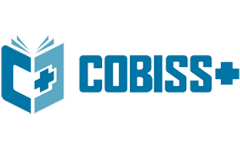The Influence of Organizational Support to Knowledge Sharing at Universities in Indonesia
DOI:
https://doi.org/10.61841/966q2f91Keywords:
Organizational Support, Knowledge Sharing, UniversitiesAbstract
Objective: To produce a study of organizational support for knowledge sharing (KS) in private universities in Indonesia. Design/method/approach: Combined qualitative and quantitative research, the test tool uses SEM (Structural Equation Modeling) for the verification hypothesis. Whereas for qualitative research with FGD and interviews. Originality/value—based on searches from several previous studies—shows that research on the influence of organizational support for knowledge sharing has never existed. So that this research can be used as literature to increase knowledge sharing in the university environment. Findings: Increasing sharing of knowledge in higher education institutions can be carried out effectively if organizational support is enhanced.
Downloads
References
[1] Amin, S.S.S. 2013. The Impact of Organisational Support for Career Development and Supervisory Support on Employee Performance: An Empirical Study from Pakistani Academic Sector. European Journal of Business Management, 5(5(:194-207.
[2] Anchalee, Kokanuch, Khwanruedee., (2014)., Knowledge Sharing Capability And Organizationalperformance: A Theoretical Perspective 10th International Academic Conference, Vienna ISBN 978-80-87927-02-1, Iises
[3] Ashmiza, Nor., (2013)., To share or not to share? Research-knowledge sharing in higher education institution: preliminary results., International Journal of Information Technology and Management., Volume 12 Issue ¾.
[10] Denison, D.R. (1996). What is the Difference between Organizational Cultureand Organizational Climate?
A Native's
[11] Dokhtesmati, Mohaddeseh., Roghayeh (2013)., Knowledge Sharing in Iranian academic institutions: Metaanalysis approach. Procedia - Social and Behavioral Sciences 73 ( 2013 ) 383 – 387
[12] Eder and Robert Eisenberger. (2008). Perceived Organizational Support: Reducing the Negative Influence of Coworker Withdrawal Behavior. Journal of Management, Vol. 34 No. 1, February 2008 55-68 DOI: 10.1177/0149206307309259.
[13] Griffin & Moorhead., 2014., Organizational Behavior., “Managing People and Organization., Eleventh Edition.,Cengange Learning., South-western. ISBN-13:978-1-133-62669-5.
[14] Kokanuch, Tuntrabundit., 2014. Knowledge Sharing Capability And Organizational Performance: A Theoretical Perspective. 10th International Academic Conference, Vienna Isbn 978-80-87927-02-1, Iises.
[15] Kurt Lewin M. Keller, 1992, Instructional Design Theory and Models : An Overview of Their Current Status, Charles M. Regeluth (ed), Lawrence Erlbaum Associates, London.
[16] Litwin, G.H., & Stringer, R.A. Jr. (1968). Motivation and organizational climate.Boston: Harvard University Press.
[17] Luthans, Fred., 2011., Organizational Behavior “An Evidance-Based Approach”., Twelfth Edition., International edition., Exclusive rights by McGraw-Hill Education. Asia. Printed in Singapore.
[18] Mathis, R & Jackson, J. 2011. Human Resource Management. Terjemahan Diana Angelica. Jakarta: Penerbit Salemba Empat.
[19] Mc Shane, Glinow, Von. 2010. Organizational Behavior. Fifth Editions. United State.
[20] Miao, Kim., 2014.. Perceived Organizational Support, Job Satisfaction and Employee Performance: An
[21] Ming dan Jessica., (2010)., Knowledge Sharing in Academic Institutions: a Study of Multimedia University Malaysia., Electronic Journal of Knowledge Management Volume 7 Issue 3.
[22] Nassuora, Ayman Bassam and Hasan, Shahizan (2010) Knowledge sharing among academics in institutions of higher learning.In: Knowledge Management International Conference 2010 (KMICe2010), 25-27 May 2010, Kuala Terengganu, Malaysia.
[23] Natário, Maria & Manuela., (2014)., Higher Education Institution Organizational Climate., Survey International Journal of Advances in Management and Economics., Vol.3.
[24] Norhadi, Zawiyah &Yusof., Conceptual Framework for Knowledge Sharing Initiative in Institution of Higher Learning to Enchance The Teaching Performance and Innovation Scientific Journal of PPI-UKM.
[25] Popoola, Sunday O. 2009. Organizational Commitment Of Records Management Personnel In Nigerian Private Universities. Records Management Journal. Vol. 19 No. 3. pp. 204-217. Emerald Group Publishing Limited.
[26] Raza, Pir Ali Shah. (2010) Impact Of Organizational Climate On Performance Of College Teachers In Punjab. Journal of College Teaching & Learning – October 2010 Volume 7, Number 10.
[27] Reyes & Zapata. (2014) Relation Between Organizational Climate and its Dimensions and Knowledgesharing Behavior among Knowledge Workers. INT.J.PSYCHOL.RES. 2014; 7 (2): 64-75.
[28] Riege, A. (2003) “Three-dozen Knowledge-sharing Barriers Managers Must Consider” Journal of Knowledge Management. Vol. 9 No. 3.
[29] Robert J. Riggle. 2007. The impact of organizational climate variables of perceived organizational support, workplace isolation, and ethical climate on salesperson psychological and behavioral work outcomes. Disertation., University of South Florida.
[30] Ungku Ahmad, Ungku Norulkamar (2014) A review of knowledge sharing barriers among academic staff - a Malaysian perspective. Sains Humanika, 2 (2). pp. 87-91. ISSN 2289-6996
[31] Wang, S. dan Noe, R.A. (2010) “Knowledge Sharing: A Review and Directions for Future Research” Human Resource Management Review” Volume 20. p. 115-131.
[32] Naghili, A., Talebi, S., Amirifar, H. Universal adhesives: A literature review(2018) International Journal of Pharmaceutical Research, 10 (4), pp. 860-872. https://www.scopus.com/inward/record.uri?eid=2-s2.0-85063529133&partnerID=40&md5=751da630b2bd8992fd301840e1976492
[33] Shah hirva, patel jenisha (2016) bicelle: a lipid nanostructure for transdermal delivery. Journal of Critical Reviews, 3 (2), 17-22.
[34] Neeta Bhagat, Archana Chaturvedi. "Spices as an Alternative Therapy for Cancer Treatment." Systematic Reviews in Pharmacy 7.1 (2016), 46-56. Print. doi:10.5530/srp.2016.7.7
[4] Ayman Bassam Nassuora, Shahizan Hasan., (2009)., Knowledge Sharing among Academics in Institutions of Higher Learning. International Education Studies.
[5] Baranik, L.E., Roling, E.A. & Eby, L.T. 2010. Why does Mentoring Work? The Role of Perceived Organisational Support. Journal of Vocational Behaviour, 76:366-373.
[6] Bartol, K. M., and Srivastava, A. (2002), Encouraging Knowledge Sharing: The Role of Organizational Reward Systems. Journal of Leadership & Organizational Studies, 9(1), 64-76.
[7] Bilgin, N. & Demirer, H. 2012. The Examination of the Relationship among Organisational Support, Affective Commitment and Job Satisfaction of Hotel Employees. Procedia-Social and Behavioural Sciences, 51: 470-473.
[8] Budiawan, A., Saudi, M.H.M. & Sutisna, D., The Effects of Planning and Coordination towards Work Effectiveness at Faculty of Business and Management in Widyatama University, Bandung, International Journal of Engineering and Technology 7(4):348-351, December 2018.
[9] Chinomona, Richard., Maxwell Sandada. (2014)., Organisational Support and Its Influence on Teachers Job Satisfaction and Job Performance in Limpopo Province of South Africa., Mediterranean Journal of Social Sciences., MCSER Publishing, Rome-Italy Vol 5 No 9.
[10] Denison, D.R. (1996). What is the Difference between Organizational Cultureand Organizational Climate? A Native's
[11] Dokhtesmati, Mohaddeseh., Roghayeh (2013)., Knowledge Sharing in Iranian academic institutions: Meta analysis approach. Procedia - Social and Behavioral Sciences 73 ( 2013 ) 383 – 387
[12] Eder and Robert Eisenberger. (2008). Perceived Organizational Support: Reducing the Negative Influence of Coworker Withdrawal Behavior. Journal of Management, Vol. 34 No. 1, February 2008 55-68 DOI:10.1177/0149206307309259.
[13] Griffin & Moorhead., 2014., Organizational Behavior., “Managing People and Organization., Eleventh Edition.,Cengange Learning., South-western. ISBN-13:978-1-133-62669-5.
[14] Kokanuch, Tuntrabundit., 2014. Knowledge Sharing Capability And Organizational Performance: A Theoretical Perspective. 10th International Academic Conference, Vienna Isbn 978-80-87927-02-1, Iises.
[15] Kurt Lewin M. Keller, 1992, Instructional Design Theory and Models : An Overview of Their Current Status, Charles M. Regeluth (ed), Lawrence Erlbaum Associates, London.
[16] Litwin, G.H., & Stringer, R.A. Jr. (1968). Motivation and organizational climate.Boston: Harvard University Press.
[17] Luthans, Fred., 2011., Organizational Behavior “An Evidance-Based Approach”., Twelfth Edition., International edition., Exclusive rights by McGraw-Hill Education. Asia. Printed in Singapore.
[18] Mathis, R & Jackson, J. 2011. Human Resource Management. Terjemahan Diana Angelica. Jakarta: Penerbit Salemba Empat.
[19] Mc Shane, Glinow, Von. 2010. Organizational Behavior. Fifth Editions. United State.
[20] Miao, Kim., 2014.. Perceived Organizational Support, Job Satisfaction and Employee Performance: An
[21] Ming dan Jessica., (2010)., Knowledge Sharing in Academic Institutions: a Study of Multimedia University Malaysia., Electronic Journal of Knowledge Management Volume 7 Issue 3.
[22] Nassuora, Ayman Bassam and Hasan, Shahizan (2010) Knowledge sharing among academics in institutions of higher learning.In: Knowledge Management International Conference 2010 (KMICe2010), 25-27 May 2010, Kuala Terengganu, Malaysia.
[23] Natário, Maria & Manuela., (2014)., Higher Education Institution Organizational Climate., Survey International Journal of Advances in Management and Economics., Vol.3.
[24] Norhadi, Zawiyah &Yusof., Conceptual Framework for Knowledge Sharing Initiative in Institution of Higher Learning to Enchance The Teaching Performance and Innovation Scientific Journal of PPI-UKM.
[25] Popoola, Sunday O. 2009. Organizational Commitment Of Records Management Personnel In Nigerian Private Universities. Records Management Journal. Vol. 19 No. 3. pp. 204-217. Emerald Group Publishing Limited.
[26] Raza, Pir Ali Shah. (2010) Impact Of Organizational Climate On Performance Of College Teachers In Punjab. Journal of College Teaching & Learning – October 2010 Volume 7, Number 10.
[27] Reyes & Zapata. (2014) Relation Between Organizational Climate and its Dimensions and Knowledgesharing Behavior among Knowledge Workers. INT.J.PSYCHOL.RES. 2014; 7 (2): 64-75.
[28] Riege, A. (2003) “Three-dozen Knowledge-sharing Barriers Managers Must Consider” Journal of Knowledge Management. Vol. 9 No. 3.
[29] Robert J. Riggle. 2007. The impact of organizational climate variables of perceived organizational support, workplace isolation, and ethical climate on salesperson psychological and behavioral work outcomes. Disertation., University of South Florida.
[30] Ungku Ahmad, Ungku Norulkamar (2014) A review of knowledge sharing barriers among academic staff - a Malaysian perspective. Sains Humanika, 2 (2). pp. 87-91. ISSN 2289-6996
[31] Wang, S. dan Noe, R.A. (2010) “Knowledge Sharing: A Review and Directions for Future Research” Human Resource Management Review” Volume 20. p. 115-131.
[32] Naghili, A., Talebi, S., Amirifar, H. Universal adhesives: A literature review(2018) International Journal of Pharmaceutical Research, 10 (4), pp. 860-872. https://www.scopus.com/inward/record.uri?eid=2-s2.0-85063529133&partnerID=40&md5=751da630b2bd8992fd301840e1976492
[33] Shah hirva, patel jenisha (2016) bicelle: a lipid nanostructure for transdermal delivery. Journal of Critical Reviews, 3 (2), 17-22.
[34] Neeta Bhagat, Archana Chaturvedi. "Spices as an Alternative Therapy for Cancer Treatment." Systematic Reviews in Pharmacy 7.1 (2016), 46-56. Print. doi:10.5530/srp.2016.7.7
Downloads
Published
Issue
Section
License
Copyright (c) 2020 AUTHOR

This work is licensed under a Creative Commons Attribution 4.0 International License.
You are free to:
- Share — copy and redistribute the material in any medium or format for any purpose, even commercially.
- Adapt — remix, transform, and build upon the material for any purpose, even commercially.
- The licensor cannot revoke these freedoms as long as you follow the license terms.
Under the following terms:
- Attribution — You must give appropriate credit , provide a link to the license, and indicate if changes were made . You may do so in any reasonable manner, but not in any way that suggests the licensor endorses you or your use.
- No additional restrictions — You may not apply legal terms or technological measures that legally restrict others from doing anything the license permits.
Notices:
You do not have to comply with the license for elements of the material in the public domain or where your use is permitted by an applicable exception or limitation .
No warranties are given. The license may not give you all of the permissions necessary for your intended use. For example, other rights such as publicity, privacy, or moral rights may limit how you use the material.
















